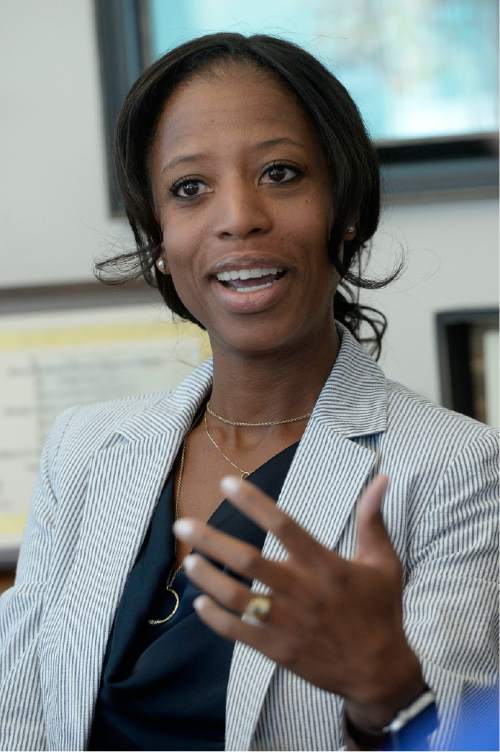This is an archived article that was published on sltrib.com in 2016, and information in the article may be outdated. It is provided only for personal research purposes and may not be reprinted.
A wealthy conservative trying to push the Republican Party into fighting climate change has dubbed Rep. Mia Love a "clean-energy champion" and is spending at least $100,000 on digital ads supporting her re-election.
The ClearPath Action Fund is a new group created by Jay Faison, a North Carolina entrepreneur, and his interest in Love is based partly on her votes during her first term and partly on what she may become if given more time in office.
"Mia Love is a candidate who wants to do the right thing, who is moving in that direction. She has shown her support for a couple of key clean-energy policies, and we look forward to see her develop that out further," Faison told The Salt Lake Tribune.
Love is "good for the state of Utah," Faison said because her status as the first black Republican woman elected to Congress "adds a different perspective to a party that frankly needs it."
When it comes to clean energy, Faison points to a bill Love co-sponsored that would allow clean-energy groups to tap an investment vehicle often used by oil and coal to raise money cheaply, and another bipartisan proposal that would make it easier to site wind and solar projects on federal lands. She also held a public meeting in Salt Lake City earlier this year focused on clean energy, including a panel discussing the need for electric trucks and a tax on carbon emissions (a position she doesn't support).
But more established environmental groups, which tend to support Democrats, see Love as an opponent — someone who wants to limit regulation, including rules imposed by the Environmental Protection Agency.
Love's challenger, Democrat Doug Owens, received the endorsement of the Outdoor Industry Association, the first time the bipartisan group has endorsed a nonincumbent. The League of Conservation Voters Action Fund has also backed Owens and is raising money for his campaign.
"Doug Owens understands that we have an obligation to protect our planet for our children and grandchildren," said league President Gene Karpinski.
Love scored a zero in the league's environmental rating partly for her support of the Keystone pipeline project and an effort to end the nation's ban on exporting oil.
Matt Pacenza, executive director of HEAL Utah, is skeptical of ClearPath and its endorsement of Love.
"I haven't seen her, in any way, be a vocal leader on climate change or any other environmental issue here," said Pacenza, whose group has no political arm and doesn't endorse candidates. "I'm not sure it is compatible to believe in limited regulations and taking strong steps forward toward cleaning our air or battling climate change."
He also said it is hard to take an environmental group seriously if it supports clean-coal technologies.
Clean coal and gas are the first of ClearPath's four "conservative clean energy pillars," followed by nuclear, hydropower and innovation. Faison is more skeptical about wind and solar.
Despite the massive difference in ClearPath's approach to clean energy, Pacenza said it is encouraging that there's a conservative group pushing for carbon-emission reductions.
Faison said opinions like those held by Pacenza and the League of Conservation Voters are limiting, creating a divide that focuses on the veracity of climate-change science while ignoring more practical areas where Republicans could work with Democrats on alternative-energy policies.
And while his website doesn't ever use the phrase "climate change," Faison believes it is a real problem and so does Love.
During a recent interview with The Salt Lake Tribune's editorial board, however, she sidestepped a question whether climate change is a cyclical issue or caused by humans.
"It is important for us to be good stewards of the place that we live in, and whether you believe in global warming or not ... whether you believe it is caused by people, I think that is irrelevant," she said.
Owens said he understands that climate change is real and human activity contributes to it. He suggested boosting federal investment in clean-energy academic studies, and either a reduction in incentives to the fossil-fuel industry or an increase in federal incentives to clean-energy companies, but he stopped short of more restrictive environmental policies.
"I don't want to ignore science," Owens said. "What the upshot of that is of course much more complicated, because I don't want to hamstring our economy."
Some of Utah's federal lawmakers, including GOP Reps. Jason Chaffetz and Chris Stewart, have expressed skepticism over climate science, but Love didn't.
"I'm not a scientist, but I'm not going to say it is not happening," she said. "We see the environment changing. There is evidence that there are things that are happening."
Like Faison, Love supports development of new nuclear power plants and technology to capture emissions from coal plants, and she wants to incentivize energy producers to make cleaner products.
ClearPath reached out to Love and Faison met with the congresswoman before including her in his list of 12 Republican "champions." It has committed to spending at least $100,000, mostly on web ads, though also possibly mailers, as part of a wider $5 million effort this election cycle. Much of that money is focused on helping three embattled senators — Richard Burr in North Carolina, Kelly Ayotte in New Hampshire and Rob Portman in Ohio.
Faison has bankrolled ClearPath's $165 million endowment with proceeds from the sale of SnapAV, which sells audio and video equipment.
Twitter: @mattcanham



